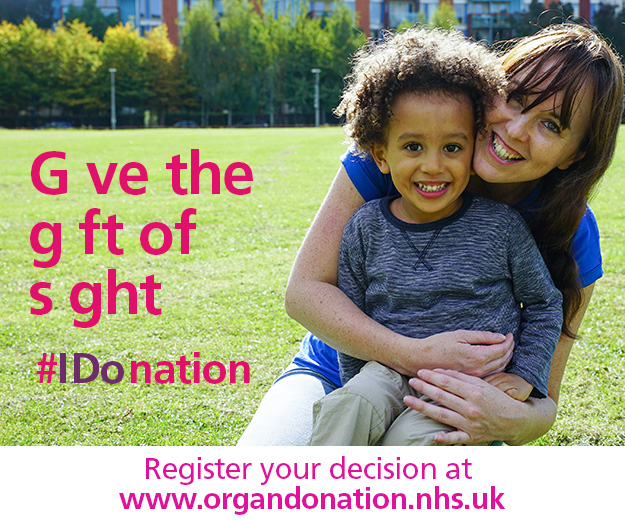Help us promote eye & tissue donation
Download materials to share
Currently half the number of corneas available than are needed for patients in the UK
People are being reminded of the importance of having a conversation about organ and tissue donation with their family or friends on World Sight Day (Thursday 8 October), as the latest statistics from NHS Blood and Transplant show patients across the country face longer waits for cornea transplants due to a drop in available corneas.
The Covid-19 pandemic has presented many challenges across the NHS, including organ and tissue donation (1). There are currently half as few corneas available than are needed for patients in the UK.
 NHS Blood and Transplant are teaming up once more with the QI elves on Twitter (2) following their fantastic support during Organ Donation Week. On World Sight Day, they are virtually donating the ‘i’ from their Twitter name and logo for the day, to help raise awareness of the ongoing need for cornea donors and are encouraging others to do the same.
NHS Blood and Transplant are teaming up once more with the QI elves on Twitter (2) following their fantastic support during Organ Donation Week. On World Sight Day, they are virtually donating the ‘i’ from their Twitter name and logo for the day, to help raise awareness of the ongoing need for cornea donors and are encouraging others to do the same.
The QI elves said, “We're thrilled to be helping to spread the word about cornea donation by donating our 'i', even if it does mean reprinting all of our stationery. Eyes are absolutely astonishing organs - they can see with the detail of sixty 4K televisions!”
One in 10 people on the NHS Organ Donor Register have indicated that they do not wish to donate their corneas, making corneas the part of the body that most people say they do not wish to donate (3). However previous research from NHS Blood and Transplant has shown that donation is more likely to be agreed if family or friends know what their relative wanted.
As of 15 September, there were 161 corneas in NHS Blood and Transplant’s eye banks – this is far less than the 350 corneas needed at any one time to supply to hospitals and means longer waits for patients for a suitable match.
This, coupled with the fact that corneas are the least selected tissue to donate, has led to potential cornea recipients having to endure a longer wait to have their sight restored or their condition improved.
 Judith Bonsor, 65 from Stockton-on-Tees, received two corneal transplants in 2020 – the first in February and second in July, on her birthday, which Judith described as ‘the best birthday present ever!’
Judith Bonsor, 65 from Stockton-on-Tees, received two corneal transplants in 2020 – the first in February and second in July, on her birthday, which Judith described as ‘the best birthday present ever!’
In 2011, Judith went for a routine optician appointment where she was told she had frosting on her eyes, but initially didn’t think anything of it as she could see fine and had only ever needed reading glasses.
After various scans and tests Judith was told she had Fuchs endothelial dystrophy, a progressive disease that affects the cornea. Over the following years, Judith’s sight began to slightly change as she noticed light was reflecting differently and it was getting increasingly more difficult to see in the mornings.
Judith said, “I was put onto the transplant waiting list in 2018. Although I was upset that my eyesight had started to deteriorate, I was surprised to be on the waiting list so soon as I thought I’d have to be much worse before being considered for a transplant.
“I was on the waiting list for two years before my two successful transplants in 2020. I’m very aware of the high number of people who choose not to donate their corneas, and I want to share my story to encourage people to rethink and show what a positive impact it can have on other people.
“The cornea transplants have allowed me to see clearly and not be looking through a haze. Before I wouldn’t drive on a morning because my eyes did not clear until after lunch and even then, they were still a little hazy. I could not read small print and light reflected off the paper sometimes making it impossible to read without a magnifying glass.
My cornea transplants have given me back my confidence.
Judith
There is hope that the introduction of Max and Keira’s Law – the new law relating to organ and tissue donation in England – which came into effect on 20th May, will lead to an increase in the number of donors, however families will continue to be consulted before organ donation goes ahead. It is therefore still important to ensure your relatives know what you would want to happen if organ donation becomes a possibility (4).
Helen Gillan, General Manager for Tissue and Eye Services at NHS Blood and Transplant, said: “Donating sight means there can be light after darkness. No one should have to go without being able to see their loved ones, which is why we are reminding people to consider giving the gift of sight.
“We understand that people often view the eyes with more emotion and see them as more symbolic than other parts of the body, but what greater gift can you give to someone than the ability to see the world around them, their loved ones faces and the independence which comes from being able to once again see things with their own eyes.
“Even now the law around organ and tissue donation has changed, families will still be approached before donation goes ahead. If you agree to cornea donation please help by sharing your decision with friends and family, so they are better equipped to act for you should that day ever come.”
Unlike with organ donation, corneas don’t have to be donated immediately. Corneas can be donated up to 24 hours after death and donation can take place in hospital, hospices, or funeral homes.
The eye is never transplanted whole (5) – only the cornea is transplanted. The cornea is the clear outer layer at the front of the eye that helps the eye to focus light.
Over the last year, 3,782 people in England have had their sight restored through cornea transplants. One donor can help up to 10 people, helping restore or improve their vision and allowing them to see their friends and family properly again.
Find out more about cornea donation or register your organ and tissue donation decision today. Make sure you have told those closest to you your organ and tissue donation decision so that they know to honour what you would like to happen.